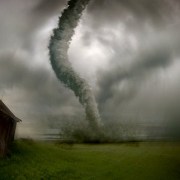Tornado Safety Tips
 Photo: Getty Images
Photo: Getty Images
According to the New York Times, this year has been the deadliest for tornadoes. More than 520 people have lost their lives from tornadoes across the U.S. The most recent tornado in Mo. was the worst one in over six decades. In Joplin alone, over 900 people have endured countless injuries from flying debris.
If you reside in a tornado prone-area, you need to become familiar with the terms "tornado watch" and "tornado warning".
Of the two terms, a tornado warning is the most serious. Seek shelter immediately if you have become informed of a tornado warning. A warning means a tornado has been spotted on radar and is imminent. Also, a tornado watch means conditions are ripe for the possibility of a tornado. If your area is under a tornado watch, stay close to a television or radio for weather updates.
If your community has a tornado warning siren, turn down volume on the radio and television. If you hear the tornado siren, seek shelter immediately. You only have minutes before the tornado passes through your area.
If you are not near a radio or television, here are some warning signs of a possible tornado:
• Very large hail
• Heavy low lying clouds
• Fast approach storm with high winds. Tornadoes generally occur after a storm.
• The sky is dark (almost greenish-grey)
• Loud howling sound of an oncoming freight train
• Large moving vertical cloud of debris or dust
• Your ears may pop from a quick pressure change
The key to surviving a tornado is having an action plan in place and an exit strategy if you live in a trailer home or if you are traveling in a vehicle.
If you live in a trailer home or car, you need to exit immediately and seek shelter in a home or business with a basement or a low lying area like a ditch. If a basement is not available, you need to seek shelter in the interior room or hallway. If you are in a bathroom, lay flat in the bathtub and cover yourself with blanket, rug or mattress to protect yourself from glass and flying debris.
Also protect your head and neck with arms. If you have time, put on your bike or ski helmet.
During a tornado, avoid windows at all costs. The high winds during a tornado causes flying debris to become spears. Glass and 2x4s have been known to pierce through walls during a tornado.
Also, avoid large wide-span roofs like you see in stores, hallways or auditoriums. These areas cause large pockets of pressure and may force the roof to lift off or burst. You do not want to be a victim of falling debris. Depending on the grade of the tornado, they have been known to cause concrete walls to collapse.
It is best to seek the center or interior room during a tornado.
Tornadoes are survivable if you are quick to react and have a plan in place. For other tips, go to:
http://www.fema.gov/hazard/tornado/index.shtm.
Sources:
http://environment.nationalgeographic.com/environment/natural-disasters/tornado-safety-tips/
http://www.aap.org/family/frk/aapfrkfull.pdf
http://www.fema.gov/areyouready/tornadoes.shtm
http://www.nytimes.com/2011/05/24/us/24tornado.html
Reviewed May 31, 2011
Edited by Alison Stanton




Add a CommentComments
There are no comments yet. Be the first one and get the conversation started!